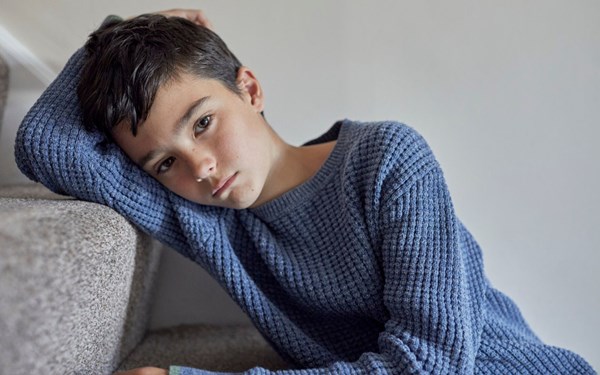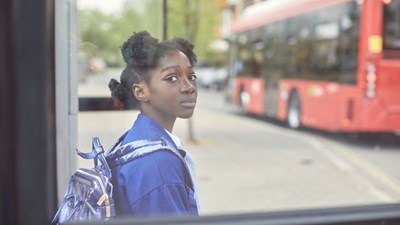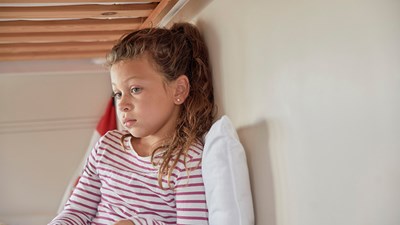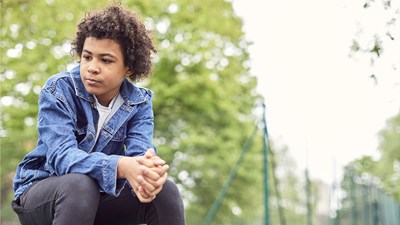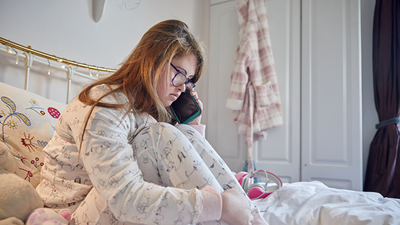Child trafficking and modern slavery are child abuse. Many children and young people are trafficked into the UK from other countries like Vietnam, Albania and Romania. Children are also trafficked around the UK.
It can be difficult to know what you can do if you're worried about a child. We have information and advice to help you feel confident in taking the next steps to keep children and young people safe.
Worried about a child?
Contact our Helpline by calling 0808 800 5000 or emailing [email protected].
What is child trafficking?
Trafficking is where children and young people tricked, forced or persuaded to leave their homes and are moved or transported and then exploited, forced to work or sold. Children are trafficked for:
- sexual exploitation
- benefit fraud
- forced marriage
- domestic slavery like cleaning, cooking and childcare
- forced labour in factories or agriculture
- committing crimes, like begging, theft, working on cannabis farms or moving drugs.
Trafficked children experience many types of abuse and neglect. Traffickers use physical, sexual and emotional abuse as a form of control. Children and young people are also likely to be physically and emotionally neglected and may be sexually exploited.
Types of child trafficking
Traffickers often groom children, families and communities to gain their trust. They may also threaten families with violence or threats. Traffickers often promise children and families that they'll have a better future elsewhere.
Trafficking is also an economic crime. Traffickers may ask families for money for providing documents or transport and they'll make a profit from money a child "earns" through exploitation, forced labour or crime. They'll often be told this money is to pay off a debt they or their family "owe" to the traffickers.
Traffickers may:
- work alone or in small groups, recruiting a small number of children, often from areas they know and live in
- be medium-sized groups who recruit, move and exploit children and young people on a small scale
- be large criminal networks that operate internationally with high-level corruption, money laundering and a large numbers of victims.
Signs of child trafficking
Knowing the signs of trafficking can help give a voice to children. Sometimes children won't understand that what's happening to them is wrong. Or they might be scared to speak out.
It may not be obvious that a child has been trafficked but you might notice unusual or unexpected things. They might:
- spend a lot of time doing household chores
- rarely leave their house or have no time for playing
- be orphaned or living apart from their family
- live in low-standard accommodation
- be unsure which country, city or town they're in
- can't or are reluctant to share personal information or where they live
- not be registered with a school or a GP practice
- have no access to their parents or guardians
- be seen in inappropriate places like brothels or factories
- have money or things you wouldn't expect them to
- have injuries from workplace accidents
- give a prepared story which is very similar to stories given by other children.
Effects of child trafficking
Trafficking can have both short and long term effects and the impact can last a lifetime.
Children and young people who've been trafficked might:
- not understand what's happened to them is abuse - especially if they've been groomed
- believe they're in a relationship with their abuser and unaware they're being exploited
- think they played a part in their abuse or have broken the law
- feel very guilty or ashamed about the abuse they've suffered.
Being kept captive or living or working in poor conditions can have a serious impact on a child's mental and physical health. They might also be suffering from the effects of abuse and neglect.
Children may feel distressed and alienated if they've been separated from their families, friends, communities and cultures.
They'll often have had no access to education or opportunity for social and emotional development.
Children exploited for domestic servitude and forced labour can suffer physical injuries, develop problems with their emotional health and be denied access to an education.
Children trafficked for sexual exploitation are at high risk of prolonged periods of sexual violence, physical injuries, sexually transmitted infections and, for girls, multiple pregnancies.
Who's at risk
Any child is at risk of child trafficking.
Human trafficking happens due to:
- inequalities between countries, such as different education or employment opportunities
- poverty
- the effects of war
- the demand for cheap or free labour or a workforce who can be easily controlled and forced into criminal activity
- low levels of education
- lack of equal opportunities, discrimination or marginalisation.
Report child trafficking
Children who are trafficked are intentionally hidden and isolated from the services and communities who can identify and protect them. If you're worried about a child, you can take steps to keep them safe.
- If you think a child or young person is in danger, contact the police on 999.
- Contact your local child protection services. You can find their contact details on the website for the local authority the child lives in.
- Contact the Modern Slavery Helpline to get help, report a suspicion or seek advice. Call 0800 012 1700 or fill in their online form.
Worried about a child?
You can contact the NSPCC Helpline by calling 0808 800 5000, emailing [email protected] or completing our report abuse online form.
Support for children and young people
Children and young people who've been trafficking might find it difficult to talk about their experiences or to tell anyone what's happened to them.
Children are often too scared to speak out. They might be frightened of:
- what'll happen to themselves, their friends and their family
- all adults and authorities
- being prosecuted for a crime
- being returned to their home country where their situation may be even worse
- Juju or witchcraft rituals performed during their experiences
- judgement from their community and families.
They may also feel very guilty or ashamed about the abuse they've suffered.
How Childline can help
We understand how difficult it is for children to talk about child trafficking. Whether it's happening now or happened in the past, Childline can be contacted 24/7.
Calls to 0800 1111 are free and confidential. Children can also contact Childline online.


